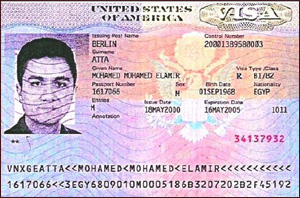 |
 |
 |
 News from Around the Americas | September 2006 News from Around the Americas | September 2006  
Claim 9/11 Terrorists Were Identified Is Rejected
 Philip Shenon - NYTimes Philip Shenon - NYTimes


| | Mohamed Atta's U.S. visa issued in Berlin, Germany on May 18, 2000, 10 days after he acquired a new passport. From 9/11 Commission report. |
The US Defense Department's inspector general this week dismissed claims by military officers and others who had insisted that a secret Pentagon program identified Mohamed Atta and other terrorists involved in the Sept. 11 attacks before the attacks occurred.

The inspector general's office, which acts as the Defense Department's internal watchdog, said in a report that its investigators found no evidence to suggest that the intelligence program, known as Able Danger, had identified Mr. Atta, the Egyptian-born ringleader of the attacks, or any of the other terrorists before Sept. 11.

"We concluded that prior to Sept. 11, 2001, Able Danger team members did not identify Mohamed Atta or any other 9/11 hijackers," the report said. "While we interviewed four witnesses who claimed to have seen a chart depicting Mohamed Atta and possibly other terrorists or 'cells' involved in 9/11, we determined that their recollections were not accurate."

The claim that a secret Pentagon data-mining program had known of Mr. Atta and other hijackers before Sept. 11 created a stir when the witnesses' accounts became public last year, because it suggested that the Defense Department had information that might have helped pre-empt the attacks had it been shared outside of the Pentagon.

The inspector general's report, prepared at the request of several members of Congress, was criticized Thursday by Representative Curt Weldon, Republican of Pennsylvania, who is a member of the House Armed Services Committee and who helped bring information about Able Danger to light.

"I am appalled that the Department of Defense inspector general would expect the American people to actually consider this a full and thorough investigation," Mr. Weldon said, describing the inspector general as having "cherry-picked testimony from witnesses in an effort to minimize the historical importance of the Able Danger effort."

The report found that the recollections of most of the witnesses appeared to focus on a "single chart depicting Al Qaeda cells responsible for pre-9/11 terrorist attacks" that was produced in 1999 by a defense contractor, the Orion Scientific Corporation.

While witnesses remembered having seen Mr. Atta's photograph or name on such a chart, the inspector general said its investigation showed that the Orion chart did not list Mr. Atta or any of the other Sept. 11 terrorists, and that "testimony by witnesses who claimed to have seen such a chart varied significantly from each other."

The report says that a central witness in the investigation, an active-duty Navy captain who directed the Able Danger program, had changed his account over time, initially telling the inspector general's office last December that he was "100 percent" certain that he had seen "Mohamed Atta's image on the chart."

But in an interview this May, the report said, the officer, Scott J. Phillpott, changed his story, telling investigators that he had been confused and was now "convinced that Atta was not on that chart" but that, instead, the terrorist's photograph was reproduced on a separate document that he was shown by an intelligence analyst on the Able Danger team in June 2000.

The inspector general's report suggests that the independent federal commission that investigated the Sept. 11 attacks was right to dismiss Captain Phillpott's initial claims about Able Danger.

The Sept. 11 commission acknowledged last year that the Navy captain had come to its investigators in July 2004, only days before it issued its final report.

The inspector general's report also rejected claims by another of the witnesses, Lt. Col. Anthony Shaffer, a veteran military intelligence officer, that he had faced reprisals for having make disclosures about Able Danger, including revocation of his security clearance. | 
 | |
 |



